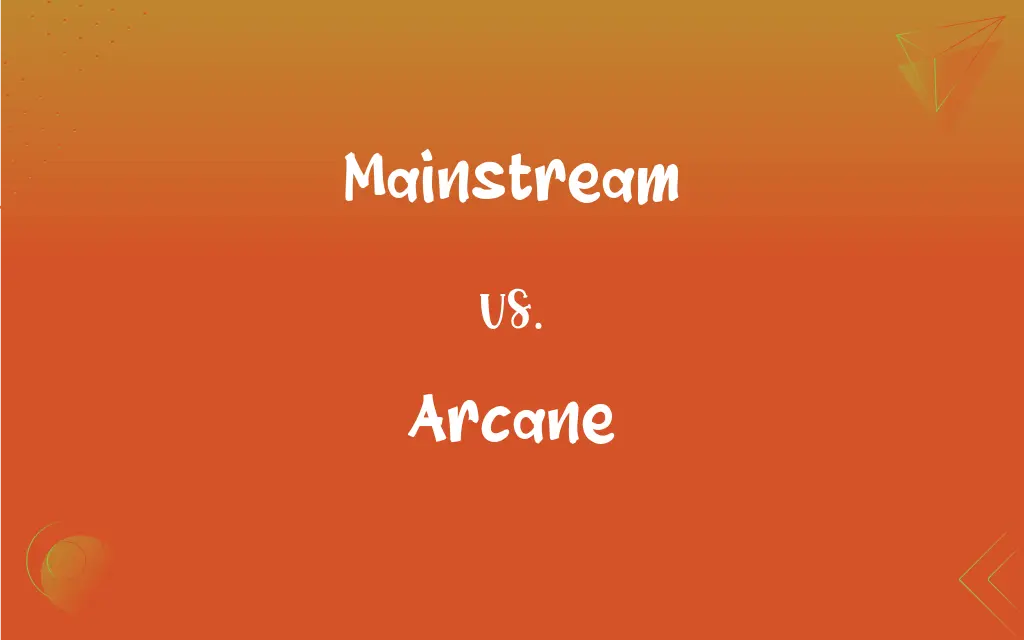Mainstream vs. Arcane: What's the Difference?
By Janet White & Harlon Moss || Updated on March 4, 2024
Mainstream refers to ideas, attitudes, or activities that are regarded as ordinary or conventional within society, while arcane involves knowledge or information that is mysterious, secret, or known only to a few people.

Key Differences
Mainstream concepts, practices, or beliefs are widely accepted and embraced by the majority within a society or culture. They are easily accessible and understood by the general population, reflecting common values, trends, and norms. Mainstream media, for example, reaches a broad audience, offering content that appeals to a wide range of people. On the other hand, arcane knowledge or information is characterized by its obscurity and the limited number of individuals it is accessible to. This could include specialized jargon in a particular field, esoteric practices, or information deliberately kept confidential for various reasons.
The distinction between mainstream and arcane also reflects in their accessibility and appeal. Mainstream ideas or products are designed to be as inclusive and appealing as possible, often prioritizing mass acceptance and understanding. Conversely, arcane knowledge requires a level of initiation or specialized interest to be fully comprehended or appreciated, appealing to a niche audience with specific interests or backgrounds.
Culturally, mainstream and arcane can represent two ends of a spectrum concerning public awareness and engagement. Mainstream culture shapes and is shaped by the collective consciousness, contributing to a shared social identity. Arcane culture, however, thrives on exclusivity and the allure of the hidden, often fostering a sense of community among those in the know but remaining enigmatic to outsiders.
In terms of impact, mainstream ideas, practices, or products have the power to influence societal norms and behaviors on a large scale, often leading to significant cultural, economic, or political effects. Arcane knowledge, while it may have a profound impact within its sphere, tends to influence smaller, more targeted groups, potentially leading to the preservation of specialized knowledge or the development of subcultures.
Despite their differences, both mainstream and arcane elements play essential roles in the cultural and intellectual landscape. Mainstream serves as a unifying force, providing a common ground for societal engagement, while arcane elements enrich the cultural tapestry with depth, diversity, and complexity, offering avenues for exploration beyond the ordinary.
ADVERTISEMENT
Comparison Chart
Definition
Widely accepted and embraced by the majority.
Mysterious, secret, or known only to a few.
Accessibility
Easily accessible and understood by the general population.
Limited access, requiring specialized knowledge or interest.
Audience Appeal
Designed to appeal to a wide range of people.
Appeals to a niche audience with specific interests.
Cultural Impact
Shapes and is shaped by collective consciousness, contributing to shared social identity.
Enriches cultural diversity with exclusivity and depth, influencing subcultures.
Influence Scope
Has the power to influence societal norms and behaviors on a large scale.
Influences smaller, targeted groups, preserving specialized knowledge.
ADVERTISEMENT
Mainstream and Arcane Definitions
Mainstream
Commonly accepted cultural or societal norms.
Streaming services have become a mainstream entertainment source.
Arcane
Esoteric spiritual or mystical practices.
Alchemy is an arcane practice with roots in both science and mysticism.
Mainstream
Widely used technologies or products.
Smartphones are a mainstream technology used globally.
Arcane
Specialized scientific knowledge or terminology.
Quantum mechanics is seen as arcane by those outside the physics community.
Mainstream
General education curriculum.
Standardized tests are a part of the mainstream education system.
Arcane
Obscure laws or regulations.
Medieval legal codes are arcane to modern legal practitioners.
Mainstream
Popular music or fashion trends.
Pop music is considered mainstream due to its wide appeal.
Arcane
Rare or specialized literature.
Grimoires are books of magic that contain arcane knowledge.
Mainstream
The prevailing current of thought, influence, or activity
"You need not accept the nominee's ideology, only be able to locate it in the American mainstream" (Charles Krauthammer).
Arcane
Secret societies or closed communities.
Freemasonry is often considered arcane due to its secretive nature.
Mainstream
Representing the prevalent attitudes, values, and practices of a society or group
Mainstream morality.
Arcane
Known or understood by only a few
Arcane economic theories.
Mainstream
To integrate (a student with special needs) into regular school classes.
Arcane
Understood by only a few.
Arcane rituals
Mainstream
To incorporate into a prevailing group.
Arcane
(by extension) Obscure, mysterious.
Arcane origins
Arcane details
Mainstream
Used or accepted broadly rather than by small portions of a population or market.
They often carry stories you won't find in the mainstream media.
Arcane
Requiring secret or mysterious knowledge to understand.
Mainstream
The principal current in a flow, such as a river or flow of air
Arcane
Extremely old (e.g. interpretation or knowledge), and possibly irrelevant.
Mainstream
That which is common; the norm.
Ideas outside of the mainstream
Arcane
Hidden; secret.
Mainstream
(transitive) To popularize, to normalize, to render mainstream.
Arcane
Requiring secret or mysterious knowledge;
The arcane science of dowsing
Mainstream
(intransitive) To become mainstream.
Mainstream
To educate (a disabled student) together with non-disabled students.
Mainstream
The prevailing opinion or practise; as, the doctor avoided using therapies outside the mainstream of modern medical practice.
Mainstream
TO place (a student) in regular school classes; - used especially of mentally or physically handicapped children.
Mainstream
The prevailing current of thought;
His thinking was in the American mainstream
Mainstream
Mainstream media outlets.
National broadcast news channels are considered mainstream media.
FAQs
How does mainstream media differ from niche media?
Mainstream media targets a broad audience with content appealing to general interests, while niche media focuses on specific topics or audiences.
What makes something mainstream?
Something becomes mainstream when it is widely accepted, popular, and integrated into everyday society and culture.
What role does the internet play in bridging the gap between mainstream and arcane?
The internet facilitates access to a wide range of information, making it easier for arcane topics to reach a larger audience and potentially become mainstream.
Why is arcane knowledge considered mysterious?
Arcane knowledge is considered mysterious because it is obscure, not widely understood, and often accessible only to those with specialized interest or initiation.
How do cultural shifts affect what is considered mainstream or arcane?
Cultural shifts, influenced by social, technological, and political changes, can redefine what is considered mainstream or arcane as societal values and interests evolve.
Can arcane become mainstream?
Yes, arcane ideas or trends can become mainstream if they gain widespread acceptance and appeal, transitioning from niche to widely recognized.
Is the transition from arcane to mainstream always positive?
The transition can be positive in terms of broader acceptance and understanding, but it may also lead to dilution of the original complexity or exclusivity of the arcane subject.
Can something be both mainstream and arcane in different contexts?
Yes, a subject might be mainstream within one community or field while remaining arcane to the general public or in another cultural context.
What impact do mainstream trends have on societal values?
Mainstream trends can significantly influence societal values by shaping norms, behaviors, and perceptions of what is considered acceptable or desirable.
What challenges do arcane subjects face in gaining recognition?
Arcane subjects often face challenges such as limited accessibility, the complexity of the material, and a lack of immediate relevance or appeal to the general public.
Why do some people prefer arcane knowledge over mainstream information?
Some individuals seek arcane knowledge for its depth, exclusivity, or the challenge of understanding complex or hidden aspects of a subject.
How does globalization affect the mainstream-arcane dichotomy?
Globalization can blur the lines between mainstream and arcane by exposing diverse cultures and ideas, making previously obscure knowledge more accessible worldwide.
Can the mainstream acceptance of an arcane subject alter its original meaning?
Yes, as arcane subjects gain mainstream acceptance, their original meanings or practices can be simplified, commercialized, or otherwise altered to appeal to a broader audience.
What impact does the mainstreaming of arcane ideas have on subcultures?
The mainstreaming of arcane ideas can lead to subcultures losing their distinctiveness and exclusivity, potentially causing a dilution of their identity and values.
Why might someone seek out arcane knowledge or experiences?
Individuals might seek out arcane knowledge or experiences for intellectual challenge, spiritual exploration, or to cultivate a sense of uniqueness and identity separate from mainstream culture.
Can mainstream and arcane coexist within the same cultural or social sphere?
Yes, mainstream and arcane can coexist within the same cultural or social sphere, with individuals navigating between widely accepted ideas and more obscure, specialized knowledge based on personal interests and social contexts.
How do trends transition from arcane to mainstream?
Trends transition from arcane to mainstream through increased visibility, media coverage, and adoption by influential figures, gradually gaining acceptance and popularity among the wider public.
What role do educational institutions play in defining mainstream and arcane knowledge?
Educational institutions play a significant role by determining curriculum content, which influences what is considered essential (mainstream) knowledge versus specialized (arcane) knowledge.
How do social media platforms influence what becomes mainstream?
Social media platforms significantly influence mainstream culture by amplifying trends, ideas, and products, making them rapidly accessible to a global audience.
How do market forces contribute to the mainstreaming of arcane ideas?
Market forces contribute by identifying and capitalizing on niche interests, developing products, and marketing strategies that bring arcane ideas to a broader, more mainstream audience.
About Author
Written by
Janet WhiteJanet White has been an esteemed writer and blogger for Difference Wiki. Holding a Master's degree in Science and Medical Journalism from the prestigious Boston University, she has consistently demonstrated her expertise and passion for her field. When she's not immersed in her work, Janet relishes her time exercising, delving into a good book, and cherishing moments with friends and family.
Co-written by
Harlon MossHarlon is a seasoned quality moderator and accomplished content writer for Difference Wiki. An alumnus of the prestigious University of California, he earned his degree in Computer Science. Leveraging his academic background, Harlon brings a meticulous and informed perspective to his work, ensuring content accuracy and excellence.































































